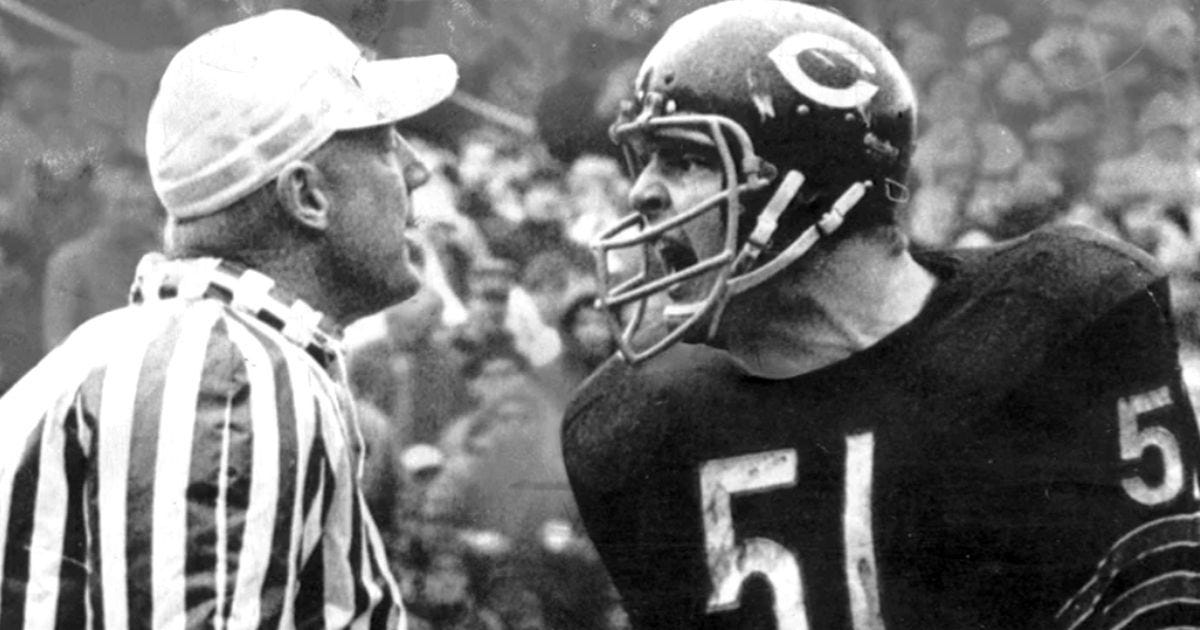Dick Butkus, the White Queen, and Pascal’s Wager
God and the Gridiron.
Image: movieweb.com
Dick Butkus of the Chicago Bears was one of the most fearsome linebackers to patrol the gridiron in the history of the National Football League. He was big, strong, fast, and one of the hardest hitters to ever put on shoulder pads and a helmet. His passing gives us reason to think about the famous argument from Blaise Pascal, the 17th-century French philosopher, concerning the rationality of belief in the existence of God.
Place Your Bets
Image: Blaise Pascal, famousinventors.org
Pascal’s wager is an argument whose form is familiar to anyone who has had to make a hard decision. It is what economists call an expected utility calculation and what policy folks call a cost-benefit analysis.
The argument runs like this: we can choose whether to believe in the existence of God or not. Independent of our belief, God either actually exists or not. That sets up four possibilities: (1) We believe in God who does exist, (2) we believe in god who does not exist, (3) we do not believe in God who does exist, and (4) we do not believe in God who does not exist.
We can then consider the consequences for each of those cases. In the first case, there is a bonanza of a payoff. If God does exist and we do believe, then we will act the way God prefers and the result will be an eternal jackpot. In the second case, if we believe in a non-existent God, there is a cost of some days spent praying that could have been used otherwise, but all in all, there’s not really much of a difference. The third possibility is the worst for us. By not believing in a God that does exist, we risk eternal damnation or some such punishment that is far from desirable. And in the final case, not believing in a non-existing God comes with at best very minor benefits.
The expected utility is the likelihood of something happening multiplied by the benefit or penalty associated with it. Megamillions may have a billion-dollar payout, but it is only because it is so astronomically unlikely you will win. When we consider the case of deistic belief, the odds are hard to compute, but the help or harm involved is either extreme or trivial, so Pascal tells us not to worry. It becomes obvious that the potential benefit of belief is so great and potential suffering from disbelief is so great, that no matter what the odds of God actually existing, the rational money is on God’s existence.
This is a strange argument. There are plenty of other famous arguments in support of the existence of god: Anselm’s ontological argument, Aquinas’ cosmological argument, and Paley’s teleological argument are three of the most well-known and in each case, evidence is cited that is claimed to make the conclusion—that God exists—more than likely true. If any of these arguments are sound, then there is rational warrant for belief in the truth of the claim of God’s existence.
That is how arguments usually work. Here is something I think you should believe and here are the grounds upon which you should think it is the case. The evidence makes the conclusion probably true and seeing the connection, you can’t help but believe it.
But that is not what Pascal is doing. Pascal’s argument provides absolutely no grounds for making the existence of God more likely than it was before you heard the argument. It does not address the likelihood of God’s existence at all. It just tells you what would be the most advantageous for you to choose to believe.
Choose to believe? Do we really choose to believe things? Can we freely choose to believe anything we want?
Before Breakfast?
Image: fanpop.com
In Lewis Carroll’s classic Through the Looking Glass, Alice has a famous exchange with the White Queen:
“I'm just one hundred and one, five months and a day.”
“I can't believe that!” said Alice.
“Can't you?” the Queen said in a pitying tone. “Try again: draw a long breath, and shut your eyes.”
Alice laughed. “There's no use trying,” she said: “One can't believe impossible things.”
“I daresay you haven't had much practice,” said the Queen. “When I was your age, I always did it for half an hour a day. Why, sometimes I've believed as many as six impossible things before breakfast.”
The White Queen’s claim that Alice needs more practice and needs to try harder strikes us as odd. If we know something is impossible, then we know it is false. If we know it is false then we cannot simply choose to change our belief.
Plato defined knowledge as true, justified belief. To know something, you have to believe it, it must be the case in the world, and you must believe it for the right sort of reason. Let us set aside the question of what makes something the right sort of reason (that is the central question in the subfield of philosophy called “epistemology”), and lean in on the parts that seem easiest and most obvious. To know something you have to believe it and it has to be true.
You cannot know that Albert Einstein was a giraffe because he wasn’t. You might have false beliefs, but you cannot have false knowledge.
Similarly, you cannot know something without believing it. Knowledge is a special subset of beliefs. What the White Queen is asking us to do is to take something impossible, that is, something we know is false and believe otherwise. By knowing it is false, we believe it is false. But if we can choose our beliefs could we then, with a little practice and effort, change our beliefs to include what we know cannot be the case? It seems like this is what Pascal requires.
Blitzing Belief
This is where we come back to Dick Butkus. He was big. He was mean. He was scary. No one who ever laid eyes on Dick Butkus around the football field could think anything else. His opponents feared him. They had good reason.
Butkus knew that he played better when he had a chip on his shoulder when he felt he had something to prove. And nothing made him feel more like he had something to prove than being wrongly diminished, belittled, and treated lightly.
But he Dick Butkus. Nobody, and we mean nobody, belittled or treated playing across from Dick Butkus lightly. Playing against Dick Butkus meant you were going to get your butt kicked.
Yet, Butkus knew what he needed to play his best. So, he spent part of every pre-game warm-up walking the sideline looking across the field at the other team, desperately seeking out two teammates sharing a lighthearted moment before the game. When he found two opponents laughing together at something he could not hear (because he was all the way on the other sideline), he would convince himself that they were laughing at him. They were mocking him. They were minimizing him. And that made him mad enough to want to hit someone. Which, legally in the game, he did…hard.
Were those players laughing at Dick Butkus? No, they were not. Did Dick Butkus know that they were not really laughing at him? Yes. Yet, he was able to deceive himself for his own benefit. He chose a belief he knew was likely false and rode it into the Hall of Fame in Canton, Ohio.
But did he really believe it? Was Dick Butkus a real-life White Queen? Does his example show us that we can, in fact, choose our beliefs? If he was, then he and Blaise Pascal are probably sharing the most unlikely high five in the afterlife right now…and Fran Tarkenton is likely scrambling in the other direction.









There is another concept that I'd like to mention. The idea is that whether or not one believes in G-d, if G-d exists, G-d believes in US. If one conforms to what G-d wants, whether or not it is out of belief, G-d still rewards that person. Having said this, I'll take a good atheist over a religious zealot any day of the week. And, then the question of what G-d wants is next (presuming G-d exists). I got into an argument with a Trumpie when I said that people who voted for Trump belong in Hell. The man said I had no right to "speak for G-d." I wasn't doing that. It was MY opinion. I personally do not believe anybody can speak for G-d although some spiritual leaders can offer us great insights into what G-d would probably want. I don't believe in proselytizing. To me that is a violation of the human soul.
OK, now onto the White Queen and Butkis--yow! That man had the most appropriate last name! Ugh. Reminds me of Trump.
My own choice is to believe in G-d in a spiritual, non ritualistic way. I seek what I consider to be goodness in people regardless of their cosmologies--or lack thereof.
I hope all of this makes sense.